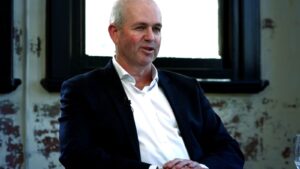Using the default system to reduce correlation with Fortlake AM
“The last thing we needed was another bond fund,” said Fortlake Asset Management founder and chief investment officer Christian Baylis.
The global fixed income and credit markets expert, who has worked at UBS Asset Management and the Reserve Bank of Australia, was explaining the firm’s focus on the “tranche” market (rather than just bonds), and the opportunity it gives investors to achieve non-correlative returns with savvy hedging of the fixed income market.
The tranche market is essentially an asset class of defaults, he explained, meaning that the actual asset being held is the likelihood of a default. It’s a concept, he admitted, that’s tricky to get your head around. “You’re not buying a corporate,” Baylis said. “You’re effectively buying access to a default or an index of defaults.”
It’s a relatively niche sliver of an asset class, but that’s what brings about it’s non-correlative benefits. Funds make money out of it when company defaults come through (typically in economic conditions when most other investment do poorly) and move into ‘Credit X’, a global auctioning system for defaults.
“You then get this pop of capital that comes through the creditor outcome,” he continued, adding that the steeper the default, the better the outcome for holders. “Meaning, the lower the cents in the dollar, the better is for our investors.”
In the past, the tranche market was run by banks and was beset by structural issues, Baylis explained. Global regulators collaborated to fix a lot of those problems, however, and “deserve a pat on the back” for standardizing the market and pushing for clearing houses to act as crucial intermediaries.
“Standardising it brought in huge amounts of liquidity, and the tranche market became this thriving market for banks to effectively manage their default risk,” he said. “And the reason they needed that market to flourish and do as well as what it is now, is because they’ve obviously got huge corporate loan portfolios and huge corporate exposures, but they could never really manage their risk, and by standardizing the market that brought in buy side capital.”
The tranche market isn’t the defining feature of Fortlake’s fixed income funds, he explained, but it’s a pivotal tool for the firm’s managers and adds a critical element of non-correlative returns for investors.
“We still do all of the boring things and the mundane things that fixed income funds do,” he said. “We’re just not sitting here saying that’s our defining feature. We use the default system primarily as a lever to reduce our correlations and give people a taste of what the default system is without being holistically exposed to it through time.”
There is certainly some complexity around the tranche market, says Baylis, who completed a degree in econometrics. “It’s like explaining to someone, when they jump on a plane, how the engine’s built,” he says. But what matter is the performance, and the way it protects portfolio performance when corresponding assets fall.
“It’s a new part of the market, and we’ve had to sort of show people that it can be utilised in a pretty simple way,” he said. “It just sounds complicated because it hasn’t been used for a long time, but ultimately, what you’re buying and selling is no different to a bond. It’s just the underlying asset has a different type of exposure, so it’s not as complex as what it sounds.”











